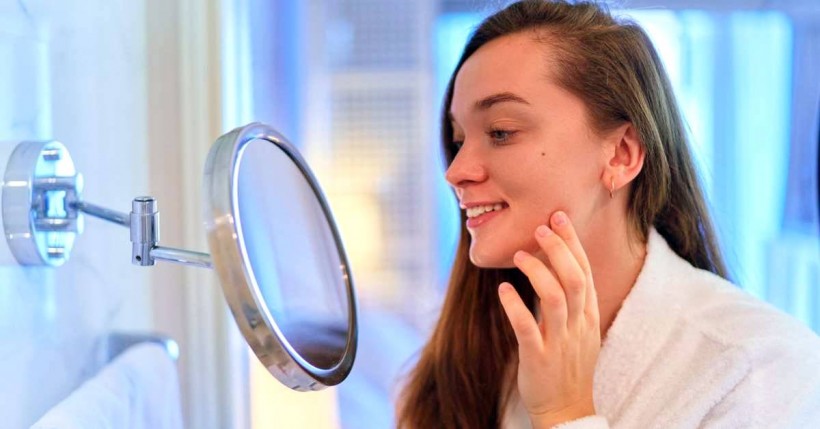Top 10 Foods That Cause Acne And How To Get Clear Skin
Warning: Undefined variable $post in /home/dietofli/public_html/wp-content/plugins/code-snippets/php/snippet-ops.php(584) : eval()'d code on line 3
Warning: Attempt to read property "ID" on null in /home/dietofli/public_html/wp-content/plugins/code-snippets/php/snippet-ops.php(584) : eval()'d code on line 3
The estimated reading time is 9 minutes
Warning: Undefined variable $post in /home/dietofli/public_html/wp-content/plugins/oxygen/component-framework/components/classes/code-block.class.php(115) : eval()'d code on line 3
Warning: Attempt to read property "ID" on null in /home/dietofli/public_html/wp-content/plugins/oxygen/component-framework/components/classes/code-block.class.php(115) : eval()'d code on line 3

Can you believe that acne breakout on your face can be related to an internal organ and a hidden health issue? According to ancient Ayurvedic and Chinese healing techniques, your nose acne is connected to stomach issues, while acne on your cheeks is a result of stress or poor digestion. This technique is called face mapping.
These facts are not scientifically proven, and of course, ancient healers used these diagnoses to explain some symptoms in the body without thorough examination and with no use of modern technology.
Nowadays, thanks to modern technology, we can explain why acne appears and what the main causes for their appearance are.
What Does Cause Them And What Does It Reveal For Your Health?
Our skin has pores that are connected to oil glands under it. If your pores are blocked by dead skin cells, dirt, bacteria and oil, you may develop a pimple.
If they appear very often, this health condition is called acne. Acne vulgaris (acne) is the most common skin condition in the United States, and it affects up to 50 million Americans per year. (1)
It can appear at any stage of life, but most commonly in puberty when the sebaceous glands activate.
It is not dangerous for your health, but it can leave scars and be sometimes painful. If you have acne and acne scars visible on your face or some parts of your body, it can also affect your self–esteem and self–confidence and lead to depression. But do not worry, as acnes are treatable and there are many treatments that exist to treat them.
The Root Causes Of Acne
Main causes of acne include:
- Clogged pores
- Increased oil production
- Excess of the hormone androgen
- Acne causing bacteria
- Sebum and keratin production
- Inflammation (2)
Emotional stress can worsen its symptoms, but it is not the direct cause of its appearance.
Additional risk factors that may cause acne:
- Hormonal changes in puberty and pregnancy
- Family history
- Sleep disorders
- Smoking
- Beauty products with high oil content
- Certain medications
One recent study has revised the old idea that it might be related to diet and the role of nutrition therapy in treating acne. (3)
There are a small number of studies that investigated the relationship between diet and acne, but the evidence shows that there is a connection, and additional research should be done for evidence-based guidelines to be established.
We will review in this article the impact on acne production and see why you should avoid eating food with a high glycemic index and dairy products to reduce acne production.
Top 10 Food To Avoid To Get Rid Of Acne
- Processed meat and refined carbs (4)
- Dairy products (milk and ice cream may worsen acne symptoms in some people). Non-dairy products such as cheese do not have any effect on acne production). Some studies confirmed that young adults who consumed milk and ice cream on a regular basis had bigger chances to get acne. (5) (6) You can start trying some milk alternatives such as almond or even cashew milk.
- Fast food – acne is very much related to the western style of life and in food rich in carbohydrates, fat, and calories. One study in China looked at the connection between the high caloric diet and acne production in adolescents. It was found that acne was produced mainly due to the diet rich in calories, family history, and psychological stress.
- Chocolate - Chocolate is suspected of being one of the food that can cause acne. Still, the results from the conducted studies show mixed results and it is not proven that chocolate is one of the factors that can lead to this skin condition. (7) But, one study showed that it appears that consumption of chocolate may increase the exacerbation of acne. (8) It is advisable to avoid milk and white chocolate as they may worsen and inflame your acne, and most of them are rich in sugar and saturated fats.
- Alcohol may alternate your hormone levels, which are one of the major factors for acne breakouts. It can also dehydrate your skin and inflame it, making the skin more susceptible to skin problems and may provoke excessive oil production.(9)
- Whey protein products – that is a protein found in dairy milk, but it is a very popular food supplement. Whey protein can increase testosterone production, leading to increased sebum and acne production. Anyone who can see that this protein causes them acnes, it will be best for them to choose another protein powder.
- Food rich in Omega 6 Fats – If there is no balance between the Omega 6 and Omega 3 fatty acids in your body this will lead your body to an inflammatory state and this causes acne. Still, more research is needed on this subject. (10)
- Refined Grains and Sugars – as they are absorbed instantly into the bloodstream and raise the blood sugar levels. Insulin provokes the activity of the hormone androgen that boosts sebum and acne production. In one study, participants who consumed more carbohydrates tended to have more acne than those who did not consume food rich in carbohydrates.
- Greasy food – Like fast food, this food rich in oil and fat can cause an acne outbreak.
- Avoid any food you are sensitive to as to its root, acne is an inflammatory disease. This is scientifically proven as corticosteroids are an effective acne treatment. In addition, people with acne had increased levels of inflammatory molecules in their blood. There is a food sensitivity test that can help you determine which food can cause inflammation in your body and start an elimination diet under the supervision of a registered dietitian or nutritionist. (11)
Food To Eat To Prevent Acne
There is food that can help you with acne treatment.
- Probiotics – promote a healthy gut and are anti-inflammatory, which can be related to acne development.
- Fresh vegetables and fresh fruits as they are rich in vitamins and fiber, especially in vitamin C which promotes collagen formation ( lemon, pumpkin, berries, sweet potato, papaya, quinoa, kale)
- Legumes as they are low - glycemic and this prevents acne breakout
- Food rich in omega 3, such as walnuts, fight inflammation. In addition, they are rich in zinc, which prevents the penetration of harmful UV rays into your skin layers. Also, fish and eggs are rich in Omega 3 and this type of food can neutralize toxins in your body and improve your mental health. One study showed that fish oil may improve acne severity and that additional research is needed in this direction. (12)
- Food rich in vitamin A and E – one study showed that people with deficiency in vitamin A, D, and E have bigger chances of getting acne. Try eating more almonds, peanuts, tuna, liver, and broccoli. (13)
- Food rich in zinc – as people with zinc deficiency are also prone to getting acne, you should eat zinc-rich food such as beans, pumpkin seeds, shellfish, and sunflower seeds.
- Turmeric – its powerful ingredient curcumin known for its anti-inflammatory properties, regulates insulin levels and acne production. It can be even applied topically on acne. (14)
- Try paleo diets: Paleo diets are rich in lean meats, fruits, vegetables, and nuts and low in grains, dairy, and legumes. She is a low glycemic diet.
And of course, drink more water! Drink at least 8 glasses per day and stay hydrated!
Does Coffee Cause Acne?
Coffee can cause acne development if taken in high doses. Nevertheless, coffee is rich in antioxidants and The Food and Drug Administration recommends a maximum of 400 milligrams a day (roughly four or five cups). (15)
Coffee can:
- Increase your stress level and this may worsen your acne symptoms
- Negatively affect your hormones as it contains white sugar, syrup, and milk, leading to acne production
- Disrupt your gut flora and inflame it and this provokes skin inflammation, especially the poor quality coffee
So, you should always:
- Drink 1 to 2 cups of coffee per day
- Drink it black and unsweetened and preferably with no milk
- Always buy high-quality coffee beans and products
Do Peanuts Cause Acne?
Yes, they might cause acne, although this claim is not scientifically backed up. They contain a critical substance similar to androgen, the hormone responsible for a man’s voice and body hair growth, and your skin is more likely to oil. This increases the tendency of getting acne. Try cashew or almonds if you need an alternative, as they do not affect androgen levels. And you have to watch to the peanut butter as well as it is loaded with vegetable oils that can contribute to acne break out.
How Do You Get Clear Skin?
We are constantly bombarded by various cosmetic and beauty products every day and we offer you few tips on getting glowing and smooth skin:
- Wash your face and make it your morning and evening skincare routine
- Choose the right facial cleanser for your skin
- Apply daily a moisturizer that’s non-comedogenic, less likely to clog your pores
- Remove the dead cells on your face by exfoliation (use mask, lotion, or face brushes). You should also speak to a dermatologist before exfoliating sessions
- Choose oil-free cosmetics, and remove them before going to sleep
- Wash the cosmetic brushes and sponges every week
- Do not stress out too much and get plenty of nice sleep, do yoga, and start exercising
- Start using anti-acne agents and topical medications prescribed by a dermatologists
- Start using clay as it is an excellent remedy for oily skin. You can apply a clay mask once a week
- Do not pip, touch, or poke your acne. This may worsen the condition. Instead, start using a treatment that will calm the readiness of the inflammation.
Will My Acne Go Away Naturally?
It is very likely that your acne will naturally go away on its own. In most cases, they go away after puberty, but there are also adults who suffer from this skin condition. Stress hormonal changes can cause adult acne, or it is just genetics. But, almost all of the acne are successfully treated as they are easily treatable.
Conclusion:
- The research done on diet and acne production is not reliable and sufficient to make any definite conclusions. Although some food is linked to increased acne production, it is not necessary to completely avoid it but to consume it in moderation.
- You should keep a food log and see how the food you are consuming has an impact on your skin.
- The best dietary approach is to treat each patient individually and reach for dietary counselling.














